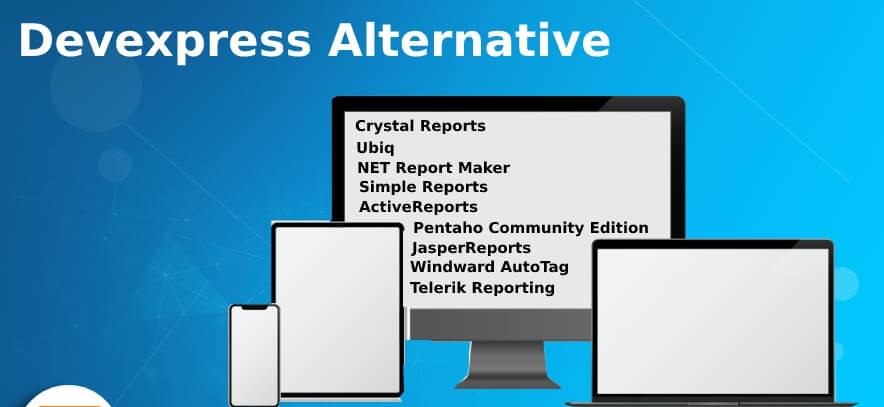Exploring DevExpress Alternatives: Discovering Options Beyond DevExpress
DevExpress is a popular and feature-rich software development framework that offers a wide range of tools and components for building robust applications. However, it’s always beneficial to explore alternative options to ensure you find the best fit for your specific development needs. In this blog post, we will dive into various DevExpress alternatives and explore their features, strengths, and benefits. Let’s discover the alternatives to DevExpress that can empower your software development journey.
UIKit and SwiftUI (Apple’s Native Frameworks)
If you are an iOS or macOS developer, UIKit and SwiftUI are excellent alternatives to DevExpress. UIKit is Apple’s native framework for building user interfaces in iOS and macOS applications, offering a comprehensive set of components and tools. SwiftUI is a declarative UI framework introduced in recent iOS versions that simplifies UI development with a modern and intuitive approach. Both frameworks provide extensive capabilities for creating visually appealing and interactive user interfaces.
Flutter
Flutter, developed by Google, is an open-source UI toolkit that allows developers to build natively compiled applications for multiple platforms, including iOS, Android, web, and desktop. Flutter offers a rich set of customizable widgets, a reactive framework, and a single codebase approach. It enables developers to create visually stunning and performant applications with hot-reload functionality for faster iteration.
React Native
React Native, backed by Facebook, is a popular cross-platform framework for building mobile applications using JavaScript and React. It allows developers to write code once and deploy it on both iOS and Android platforms. React Native leverages a bridge that connects JavaScript code with native platform components, delivering a native-like user experience. It provides a large community, extensive component libraries, and seamless integration with third-party libraries.
Xamarin
Xamarin, acquired by Microsoft, is an open-source framework that allows developers to build cross-platform applications using C# and .NET. It offers a single shared codebase and provides access to native APIs, enabling developers to create native user experiences for iOS, Android, and Windows platforms. Xamarin provides a rich set of UI controls, integration with Visual Studio, and a strong community support system.
NativeScript
NativeScript, supported by Progress, is an open-source framework for building cross-platform applications using JavaScript, TypeScript, or Angular. It allows developers to build truly native mobile applications using a single codebase. NativeScript offers direct access to native APIs, extensive plugin support, and a large ecosystem of reusable UI components. It enables developers to leverage their existing web development skills to create powerful mobile applications.
SwiftUI and Combine (Apple’s Modern Frameworks)
For iOS and macOS developers targeting the latest Apple platforms, SwiftUI and Combine are worth considering. SwiftUI provides a declarative and modern approach to UI development, while Combine is a reactive programming framework for handling asynchronous events and data flow. Together, SwiftUI and Combine offer a powerful combination for building feature-rich, reactive, and scalable applications.
Angular
Angular is a popular front-end framework developed by Google. It allows you to build scalable and dynamic web applications using TypeScript or JavaScript. With its robust architecture and comprehensive toolset, Angular offers features such as two-way data binding, component-based development, dependency injection, and a powerful templating engine. It also provides a rich ecosystem of libraries and community support.
Vue.js
Vue.js is a progressive JavaScript framework that focuses on building user interfaces. It offers a lightweight and flexible approach to development, making it easy to integrate into existing projects. Vue.js provides a virtual DOM, reactive data binding, component-based architecture, and an intuitive syntax. It has gained significant popularity due to its simplicity and ease of learning, while still being capable of handling complex applications.
Ember.js
Ember.js is a framework for creating ambitious web applications. It follows the convention-over-configuration principle and provides a set of tools and conventions to streamline development. Ember.js offers powerful features like two-way data binding, automatic updating of the UI, routing, and a robust template engine. It emphasizes developer productivity and maintainability.
Blazor
Blazor is a framework developed by Microsoft that allows you to build interactive web applications using C# and .NET. It enables you to create client-side web applications using WebAssembly or server-side applications using SignalR. Blazor provides a familiar and powerful development experience for .NET developers and allows for seamless integration with existing .NET libraries and frameworks.
Meteor
Meteor is a full-stack JavaScript framework that simplifies the development of real-time web and mobile applications. It offers an integrated stack that includes front-end, back-end, and database components. Meteor provides features like live data updates, automatic UI updates, hot code reloads, and seamless client-server communication. It allows developers to build applications using a single codebase for both web and mobile platforms.
Spring Boot
Spring Boot, based on the popular Spring framework, is a Java-based framework for building enterprise applications. It focuses on convention-over-configuration, simplifying the setup and configuration of Spring applications. Spring Boot offers features like dependency injection, auto-configuration, embedded servers, and easy integration with other Spring projects. It provides a powerful and scalable environment for developing Java applications.
While DevExpress is a popular choice for software development, exploring alternative options can help you find the perfect fit for your specific project requirements. Whether you prefer native frameworks like UIKit and SwiftUI, cross-platform solutions like Flutter, React Native, Xamarin, or NativeScript, or even Apple’s modern frameworks SwiftUI and Combine, there are numerous alternatives to DevExpress available. Take the time to evaluate their features, strengths, and community support to make an informed decision that aligns with your development goals. Embrace the power of alternative frameworks and embark on a successful software development journey.

